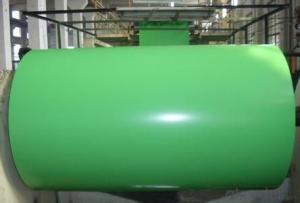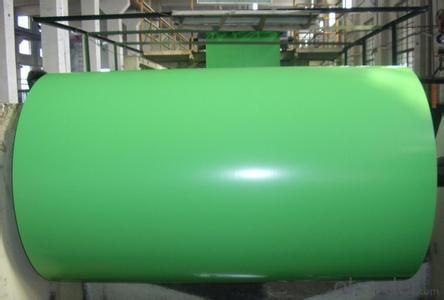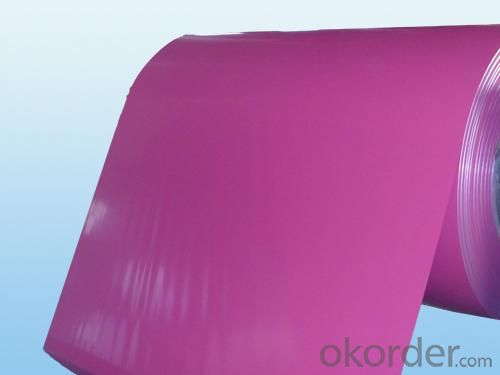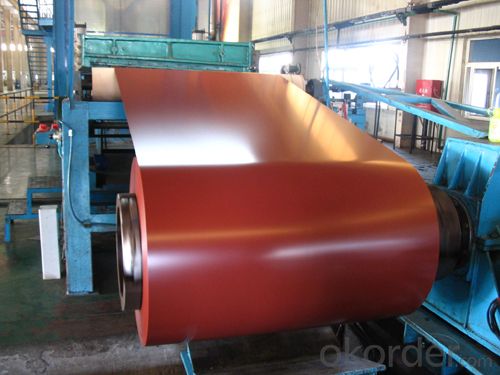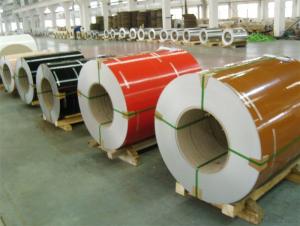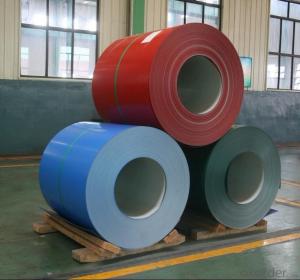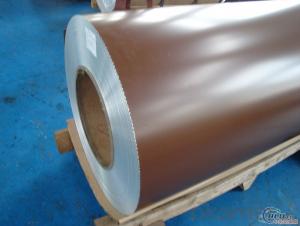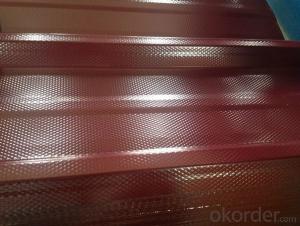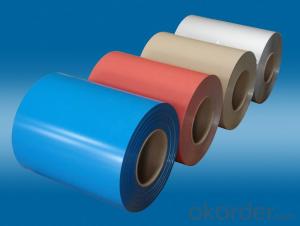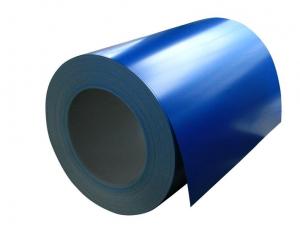Aluminum 3005 Coil Color Coated Polyester for Decoration
- Loading Port:
- China Main Port
- Payment Terms:
- TT or LC
- Min Order Qty:
- -
- Supply Capability:
- -
OKorder Service Pledge
OKorder Financial Service
You Might Also Like
1.Structure of Aluminium Prepaited Coil Description:
Coated aluminum coil/sheet are of a wide range of colors, which gives wonderful appearance no matter in residential and commercial constructions of great exhibition centers.
The coated aluminum coil/sheet have been widely used in the fields of construction and decoration( garage doors, ceiling etc.), electronic appliances, lighting decoration, air-condition air pipes, sandwich panels and drainages etc.
2.Main Features of the Aluminium Prepaited Coil:
1) High flexibility
2) Impact resistance
3) Excellent weather-proof durability
4) Anti-ultraviolet
5) High erosion resist
3.Images of the Aluminium Prepaited Coil:
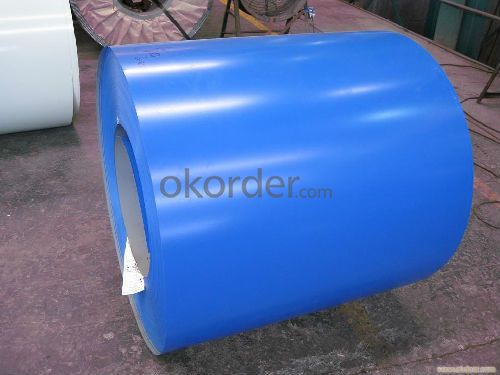
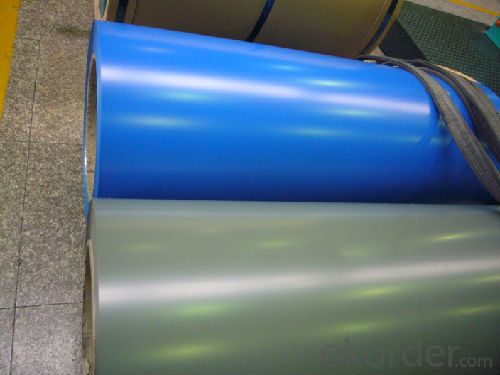
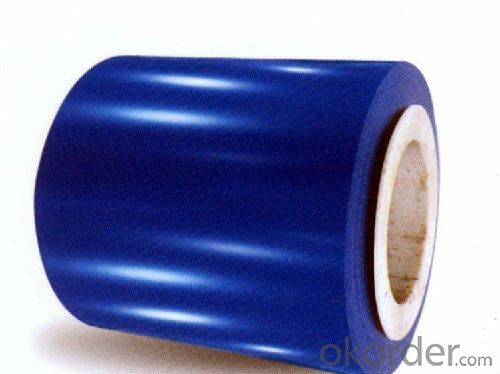
4.Aluminium Prepaited Coil Specification:
Alloy | A1100,A3003,A1050,A8011 etc |
Temper | H16,H18,H24 |
Thickness | From 0.024mm to 1.2mm |
Width | Standard width:1240mm |
Special width:1300mm,1520mm,1570mm,1595mm | |
Diameter | Standard dia:1200mm |
Interior dia:150mm,405mm,505mm | |
Weight | 2.5 T/coil,3.0 T/coil |
Coating | PE, PVDF, AC |
Surface | Embossed, mill finish, coated |
Color | AS to code RAL |
Gloss | 10-90%(EN ISO-2813:1994) |
Coating Thickness | PE: more than 18 micron |
PVDF: more than 25 micron | |
Coating Hardness (pencil resistance) | More than 2h |
Coating adhesion | 5J(EN ISO-2409:1994) |
Impact Resistance | No peeling or cracking(50 kg/cm,ASTMD-2794:1993) |
Flexibility (T-bend) | 2T |
MEK resistance | More than 100 |
5.FAQ Aluminium Prepaited Coil:
a.What is monthly capacity
---CNBM is one stated own company and our monthly capacity is about 2000tons.
b. Now which countries do you export your goods?
---Now we export to South East Asia,Africa, North America,South America ect.
- Q: Are aluminum coils suitable for decorative applications?
- Yes, aluminum coils are suitable for decorative applications. Aluminum is a versatile and lightweight material that offers excellent corrosion resistance, making it an ideal choice for decorative purposes. It can be easily shaped, formed, and fabricated into various designs, patterns, and finishes, allowing for endless possibilities in decorative applications. Additionally, aluminum coils can be coated with different colors and finishes, such as anodized or painted, to enhance their aesthetic appeal and durability. Whether it's for interior or exterior decoration, aluminum coils provide a cost-effective and visually appealing solution.
- Q: What are the properties of aluminum coils?
- Aluminum coils are highly sought after in various industries due to their numerous key properties. Firstly, they possess a high strength-to-weight ratio, which means they are both lightweight and durable. This makes them ideal for industries like aerospace, where reducing weight is crucial. Furthermore, aluminum coils exhibit exceptional corrosion resistance. The formation of a thin oxide layer on the metal surface prevents further oxidation, making them suitable for outdoor and marine environments. This corrosion resistance also extends their lifespan, reducing maintenance costs. Another important property of aluminum coils is their high thermal conductivity. This allows for efficient heat transfer, making them well-suited for applications in the HVAC industry. Additionally, they have excellent electrical conductivity, making them favorable for use in electrical and electronic components. Aluminum coils are also highly malleable and ductile, allowing for easy shaping and forming. This versatility makes them popular in manufacturing processes, such as the production of automobile parts, cans, and packaging materials. Lastly, aluminum coils are known for their recyclability. They can be easily melted down and reused without compromising their quality, making them an environmentally friendly choice. This aligns with the increasing focus on sustainability and reducing the environmental impact of industries. In conclusion, aluminum coils possess valuable properties such as high strength-to-weight ratio, corrosion resistance, thermal and electrical conductivity, malleability, and recyclability. These properties make them valuable in numerous applications across various industries.
- Q: What are the different types of aluminum alloys used for making coils?
- Coils are made from various aluminum alloys that possess unique properties and characteristics, rendering them suitable for different applications. Some commonly utilized aluminum alloys for coils include: 1. Aluminum 1100: Renowned for its exceptional corrosion resistance, high thermal conductivity, and good formability, this alloy is frequently employed in scenarios necessitating high electrical conductivity, like transformers or electrical coils. 2. Aluminum 3003: Appreciated for its moderate strength and excellent workability, this alloy boasts good corrosion resistance and is often used in applications where formability and resistance to atmospheric corrosion are essential, such as condenser coils or evaporator coils in HVAC systems. 3. Aluminum 5052: Known for its high strength, excellent corrosion resistance, and good weldability, this alloy finds extensive use in situations demanding strength and resistance to saltwater corrosion, such as marine or offshore applications. 4. Aluminum 6061: Recognized for its high strength, good corrosion resistance, and excellent machinability, this alloy is commonly employed in applications requiring high strength and good weldability, such as heat exchanger coils or automotive cooling coils. 5. Aluminum 7075: Famed for its remarkable strength and excellent fatigue resistance, this alloy is often utilized in scenarios necessitating extreme strength and resistance to stress, such as aircraft or aerospace components. These are only a few examples of the diverse aluminum alloys employed in coil production. The specific alloy chosen depends on the application's requirements, including strength, corrosion resistance, formability, or electrical conductivity.
- Q: the ingredient on the back says aluminum?also ..what is sodium benzoate?Is all this stuff that terrible for you? Or does it mean something else?
- The aluminum is in the baking powder. Very common but you can buy it without it, it is much healthier for you. Aluminum is correlated to Alzheimer's and ADD. Baked goods taste much better without the aluminum too. Benzoate of soda, a preservative that can alter your DNA. Not too good for you, no matter what the FDA may say about it. All told, if you are concerned for your health, keep to organic as much as possible and made from scratch too. Way too much junk is put in our food and health products.
- Q: hello, i'm doing a school project on aluminium and i'm a little stumped. what elements bond well with aluminium and why? thanks alot!
- Oxygen is another and AlO I believe is the most common bonded aluminum you will find.
- Q: How are aluminum coils used in the construction industry?
- Aluminum coils are widely used in the construction industry due to their numerous beneficial properties. These coils are primarily employed in the fabrication of various building components, such as roofs, facades, gutters, and cladding systems. One of the main advantages of using aluminum coils in construction is their lightweight nature. Aluminum is significantly lighter than other commonly used metals like steel, making it easier to handle and install. This lightweight property also reduces the load on the building structure, allowing for more flexibility in design and minimizing the overall construction costs. Furthermore, aluminum coils offer exceptional corrosion resistance. Aluminum naturally forms a protective oxide layer on its surface, which prevents it from rusting or deteriorating when exposed to moisture or harsh environmental conditions. This corrosion resistance ensures the longevity and durability of the building components, reducing maintenance and replacement costs in the long run. Aluminum coils are also highly malleable and can be easily formed into various shapes and sizes. This versatility allows architects and engineers to create innovative and aesthetically pleasing designs. Aluminum coils can be bent, folded, or molded to fit any architectural requirement, enabling the construction of unique and visually appealing structures. In addition, aluminum is an excellent conductor of heat and electricity. This property makes aluminum coils ideal for applications that require efficient thermal or electrical conductivity. For example, aluminum coils are often used in HVAC systems to transfer heat or in electrical wiring to ensure optimal performance. Moreover, aluminum is a sustainable and environmentally friendly material. It is 100% recyclable without losing its properties, making it a perfect choice for sustainable construction practices. The recyclability of aluminum coils reduces waste generation and conserves natural resources, contributing to a greener and more sustainable construction industry. In conclusion, aluminum coils are extensively used in the construction industry due to their lightweight nature, corrosion resistance, malleability, efficient conductivity, and sustainability. These coils facilitate the construction of durable, aesthetically pleasing, and energy-efficient buildings while reducing costs and environmental impact.
- Q: Some manufactures (Kia, Hundai) use Iron blockswhileOther manufactures (Nissan, Chevy, ect.) use Aluminum blocks*****Is the point of using Iron blocks to increase long-term durability or temperature endurance??ORIs the use of Iron blocks simply an older, simpler technology (as compared to using Aluminum), the manufacture of which costs less money??And you would think that Aluminum weight savings would transer to better MPG, but the Kia gets very comparable mileage anyway.Thank you
- Aluminum's main advantages are weight and increased mpg for CAFE regulations. If you are going to keep your car to 150,000 miles eitheir block material will do. But if you are going to keep it 300,000 to the bitter, bitter end, you are better off with iron.
- Q: This question asks for methods to prevent rusting on aluminum coils during storage and transportation.
- <p>To prevent rusting on aluminum coils during storage and transportation, ensure that the coils are clean and dry before storage. Use a protective coating or wrapping to shield them from moisture and contaminants. Store the coils in a cool, dry place away from direct sunlight and corrosive substances. Avoid stacking them where they may come into contact with acidic materials. During transportation, secure the coils properly to prevent movement that could lead to scratches or damage. Use moisture-resistant covers to protect them from the elements. Regularly inspect the coils for signs of corrosion and address any issues promptly.</p>
- Q: What are the safety regulations that need to be followed while using aluminum coil?
- <p>Yes, there are safety regulations for using aluminum coil. These include ensuring proper ventilation to prevent the buildup of aluminum dust, which can be a fire hazard. Protective equipment such as gloves and eyewear should be worn to avoid skin and eye contact with the material. Additionally, it's crucial to follow guidelines for handling and storing aluminum coils to prevent accidents, such as ensuring they are not damaged or exposed to extreme temperatures. Compliance with local and industry-specific safety standards is also essential to maintain a safe working environment.</p>
- Q: Can aluminum coils be used in high-temperature applications?
- Indeed, high-temperature applications can make use of aluminum coils. With its melting point reaching 660 degrees Celsius (1220 degrees Fahrenheit), aluminum proves itself as a fitting option for diverse high-temperature settings. Furthermore, its remarkable thermal conductivity enables efficient heat transfer, rendering it a favored selection for heat exchangers and HVAC systems. Nevertheless, it is crucial to acknowledge that the particular application and temperature needs must be taken into account, as exceedingly high temperatures surpassing aluminum's melting point might necessitate alternative materials.
Send your message to us
Aluminum 3005 Coil Color Coated Polyester for Decoration
- Loading Port:
- China Main Port
- Payment Terms:
- TT or LC
- Min Order Qty:
- -
- Supply Capability:
- -
OKorder Service Pledge
OKorder Financial Service
Similar products
Hot products
Hot Searches
Related keywords
